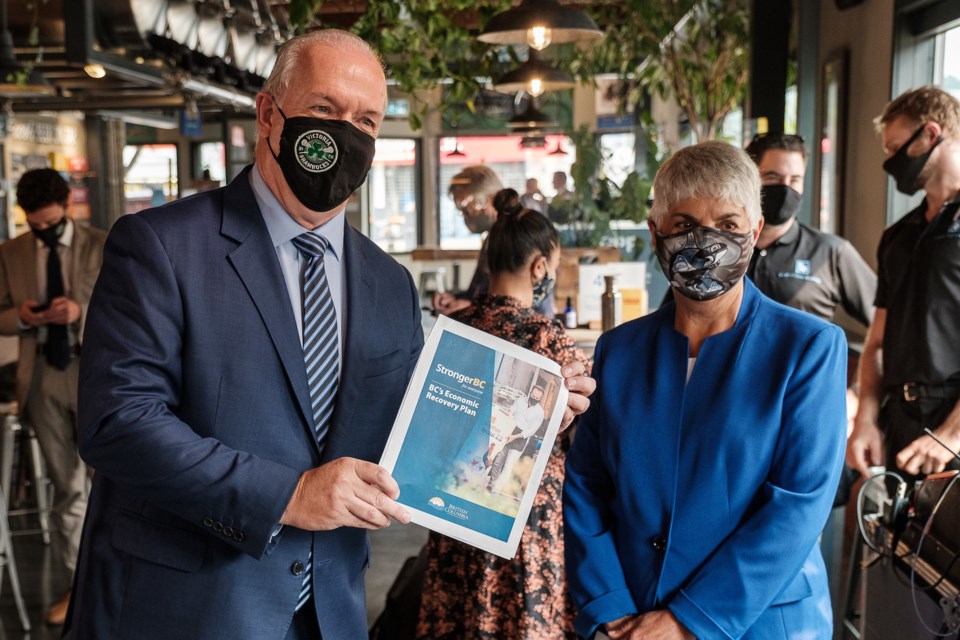John Horgan has stumbled into a tricky spot – one that reminds me of the HST.
Remember the HST? As a policy concept, it had the broad support of economists as more efficient, ultimately cheaper, and increasingly in vogue with both wise and fashionable jurisdictions elsewhere.
None of that mattered. Because people felt lied to.
Quickly rolled out after the 2009 provincial election campaign, in which it wasn’t mentioned or mused in any meaningful way, the HST was crippled by perception that it was introduced dishonestly. The ensuing slow-motion disaster effectively ended Premier Gordon Campbell’s political career, and ensured the subsequent referendum was less about tax policy, than a response to feeling misled.
That’s John Horgan’s dilemma right now, too.
Yesterday, he and finance minister Carole James announced what was supposed to be details of the $1.5 billion pandemic recovery plan, already voted and approved by all three parties of the legislature. Instead, we saw a confusing mix of new spending, a dump of previous announcements and smattering of federal funding. Promised reference materials arrived late, and the bureaucrats made available to explain things, often couldn’t.
My guess: the confusion stemmed from government communications staffers trying to navigate two separate currents: the official task of itemizing and explaining the recovery plan; and unofficial (and unemailed) political direction to prepare what looked awfully like the bones of an election platform.
Okay, back to the HST. It’s bad to be perceived as coy, or evasive on a sensitive subject. It’s much, much worse to be widely perceived as completely dishonest about something.
Case in point – actually, two cases in point. First, what are we really doing here? Everyone seems to know the government is moving towards breaking their word (and the law) and forcing an early election, but the NDP keeps insisting they’re focused only on recovery, et cetera and so forth.
Second, once it’s called, the question will be: why?
Again, everyone will know the real reason: the polls are too tempting to pass up. That’s it. Anything else will be a fabrication.
But Horgan, and all his candidates, can’t say that. (Can you imagine?) The war room will come up with some go-to lines – needing a renewed mandate, or seeking stability – but it will be, to use a technical term, bullshit.
And again, everyone will know. Every time someone asks Horgan or an NDP candidate why they’re breaking CASA and the law, not to mention risking exposure as COVID-19 numbers continue to get worse – it will be generally understood that the answer will not be the truth. The flimsier the reason given, the more insulted people will feel.
People resent feeling like their intelligence is being insulted.
In yesterday's subsequent Q&A, Horgan made an interesting admission: he is thinking about a fall election – or at least, says he hasn’t yet made up his mind. To my recollection, that’s the first time he’s allowed even that much. But he seemed uncharacteristically nervous.
This week has been a rollercoaster. I personally went from an avowed early election skeptic, to believing it was imminent. Today, I’m starting once more to question it.
There’s a chance sanity – and responsibility – will prevail. Media and online backlash has been intense; according to some sources, considerably more than the NDP figured. (The confusion surrounding yesterday's announcement didn’t help.) And behind the scenes, some within the NDP have expressed reticence.
Last night, the NDP’s provincial council – the governing body of the political party – held an emergency meeting. If enough of them speak up, even if only to say they’ve heard from supporters urging them to stop, BC may just avoid veering into an unnecessary election right as the pandemic heats back up.
Then again, maybe those polls are just too tasty.
Maclean Kay is Editor-in-Chief of The Orca
SWIM ON:
- On Monday, it looked a little more straightforward: the NDP were full steam ahead for an early election.
- On Tuesday's #BCPOLI Hotstove, Maclean and Jordan Bateman delved into the hows, whys, whens, nuts, bolts, and how-do-you-dos of an early election.
- Chris Gardner: Faced with a long, slow economic recovery, now's the time for governments to be bold.



